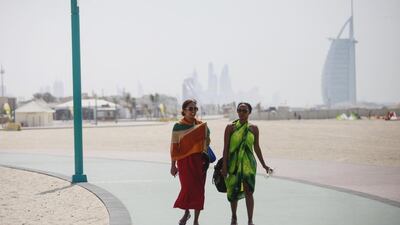ABU DHABI // Start walking and cut the risk of bowel cancer.
Experts say just 30 minutes of activity a day can reduce the chance of developing polyps – benign wart-like growths – which can develop in the lining of the colon and lead to cancer in the colon or rectum.
“A sedentary life is associated with a lot of polyps,” said Dr Makki Fayadh, of the Advanced Centre for Day Care Surgery in Abu Dhabi.
Polyps are common as people age and while most are harmless, some are potentially cancerous. However, such polyps can be removed painlessly, without an operation if caught early.
Incidences of polyps are high in the UAE, said Dr Fayadh, who conducted a study examining more than 600 colonoscopies in the emirate among men and women.
It found 30 per cents of Emiratis and 40 per cent of expatriates have polyps, 17 per cent and 15 per cent respectively of which were pre-cancerous polyps.
“The question is why, in the UAE, there is such a high incidence of polyps? It is high. It is worrying,” said the consultant physician and gastroenterologist.
There are several factors, said Dr Fayadh.
“Number one, our diet,” he said. “We eat a lot more than we need. And number two, we exercise little.”
Colorectal Cancer Awareness Month this month coincides with The National’s #startwalking month which encourages residents to become more active.
The goal is to take at least 10,000 steps a day and to compete against the other participants to see who can take the most steps.
“You cannot change your genes but you can change your environment,” Dr Fayadh said.
“We need to change our lifestyles. We need to do a lot of exercise.
“Get moving. Increase your steps every day. Run or walk for 30 minutes a day.”
Among cancers that affect both men and women, colorectal cancer is the second-leading cause of cancer deaths, according to the Centres for Disease Control and Prevention.
It takes up to 10 years for a polyp to progress to a cancer.
However, early screenings help in detecting polyps before they turn into cancer cells.
“It is a deadly disease but it shouldn’t be,” Dr Fayadh said. “It is completely preventable.”
At present, Abu Dhabi is the only emirate to screen for colorectal cancer.
“Since the time we launched the early detection programme, there have been many cases of early colorectal cancer which have been detected, in addition to the detection of curable cases where pre-cancerous polyps were removed,” said Farida Al Hosani, acting director of public health and research at the Health Authority Abu Dhabi.
In Abu Dhabi, more than 85 per cent of all colorectal cancers – the second most common cancer in the emirate – are found in people aged over 40.
Haad recommends a colonoscopy every 10 years, or a faecal immunochemical test to detect blood in a stool sample, taken every two years for men and women aged between 40 and 75.
One of the risk factors for colorectal cancer is a family history of the disease. These individuals are advised to visit medical centres for regular screenings.
According to the American Cancer Society, the lifetime risk of developing colorectal cancer is about one in 20. This risk is slightly lower among women.
Symptoms include anaemia, blood traces in stools, unintentional weight loss, difficulty swallowing and abdominal pains.
There are more than 25 facilities across Abu Dhabi that provide the screening services recommended by Haad.
For more information visit the Haad website.
jbell@thenational.ae

